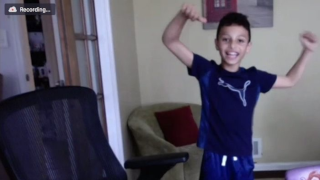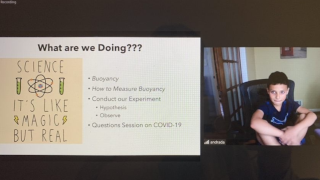Medical Students Teach Science to Kids of Hackensack Meridian Parents
Friday, June 19, 2020

Denis Colceriu, 8, the child of a Hackensack Meridian Health employee, learns about buoyancy from Hackensack Meridian School of Medicine at Seton Hall University students virtually.
The kids cackled happily, and danced around the room as they added pennies to their tin-foil boat, in a small tank of water. Dozens plunked into the seaworthy craft before it finally took on water and sank. But the boy and girl, Denis Colceriu, 8, and his sister Alexa, 6, were thrilled to watch it go.
Through the computer screen, their teachers for the afternoon, first-year medical students Nicole Feigenblum and Simmy Panesar, cheered them on in amazement.
"Science is like magic – but it's real," said Panesar, during the May 28 lesson.
The session was part of a new initiative called the NJ COVID Care Team. Panesar and Feigenblum are two of nine Hackensack Meridian School of Medicine at Seton Hall University students who plan to give back to their practicing colleagues, by teaching the children of doctors, nurses and team members in the Hackensack Meridian Health network through group workshops and tutoring sessions, physical education breakouts, and even story time.
The team says they are giving back to the people who are doing so much amid the COVID-19 pandemic.
"As medical students, we have been thinking of ways to help our Hackensack Meridian Health community that could be implemented safely," according to the group's website. "Our goal is to lessen the burden on you, by providing virtual sessions for your children. We are constantly looking for new ways to help, so we welcome suggestions and feedback."

Denis Colceriu, 8, the child of a Hackensack Meridian Health employee, learns about buoyancy from Hackensack Meridian School of Medicine at Seton Hall University students virtually.
That first session was entitled "Buoyancy: Things that Float and Things that Don't!" and it was focused on density, weight, volume – and how they all factor when objects enter water. For an hour, the children learned the terms – and then put the learning into watery action.
Additional upcoming virtual events will include story time, rounds of Jeopardy, and still more hands-on science experiments, all conducted from afar.
The other students involved in the program include Ora Batash and Lauren Valentine, the pair who first conceived of the program; as well as Jay Zaifman, Allison Zuckerberg, Caitlin Sarubbi, Teona Iarajuli, and Tai West.
The medical students, who have been receiving their education "virtually" rather than in-person due to the social distancing regulations undertaken by essentially all medical schools in the nation, initially wanted to provide childcare volunteering services. But, like at other medical schools, the in-person options were limited. As the students realized how effective virtual teaching could be, they decided to offer their new science curriculum to young children through this approach.
The virtual learning possibilities came together, and the group of students, all of whom have varying interests, came together quickly.
"This team sprung together in a day," said Valentine. "We always wanted it to be a way to give back to Hackensack Meridian Health providers."
"This whole situation has called for people to step up in different ways, and in different roles," said Batash. "Medical students are being pushed to show up as more than just fulfilling our duties until we get to the end of this learning process. Childcare or tutoring can be a way to give back to our community, and also be part of our responsibility."
Plans are currently to expand the sessions – even beyond the pandemic era, since the resource could be helpful to the health network providers.
The mother of Denis and Alexa, Andrada Pop, is a physician practice compliance specialist for Hackensack Meridian Health. She said the medical students' efforts make a quarantine lesson worth remembering, every time.
"The kids liked it a lot, as it was something different than our everyday. The science experiments are always very fun for them, as the words become things they can see and make sense of them," said Pop. "We are totally supportive of their initiative. We feel their time is well invested. In my opinion, kids will always be more receptive to ‘teachers' than parents when it comes to school work and learning."
All Hackensack Meridian Health team members who may be interested in taking part in the sessions with their children of all ages can discover more at NJCareTeam.org.
Categories: Education, Health and Medicine






